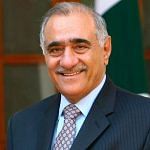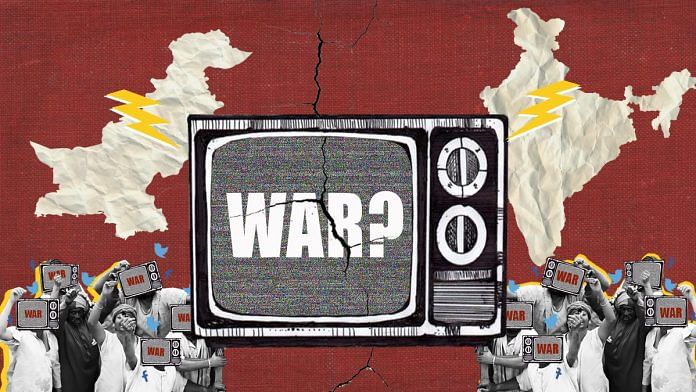Tensions escalated between India and Pakistan, as multiple unverified videos featuring a missing Indian pilot swirled on social media, and as breaking news on 24×7 TV channels — much before New Delhi confirmed he is “missing in action” after engaging with Pakistani jets.
ThePrint asks: Fighting under TV and social media glare, can India & Pakistan contain escalation?
Pakistan’s response and need for retaliation will guide escalation, not the hysteria on social media
 Kanwal Sibal
Kanwal Sibal
Executive council member, VIF, and former foreign secretary
Given their nature, the debates on social media and TV inevitably end up playing an important role in today’s public discourse. A plethora of commentaries, opinions, real and fake news are circulated on social media. Unfortunately, there are no means by which the government can control this.
In liberal societies like ours, the media is free to publish what it wishes to. There are no laws in our country, or in any democratic country, which can potentially curb news coverage in a conflict situation like this one. Ultimately, it is for the media to use their discretion and act responsibly. They are under great pressure to break stories and report at lightning speed. This often leads to sensationalism of news reports on sensitive matters.
In Pakistan’s case, the Inter-Services Public Relations unit of the armed forces exerts control over the media and can control the news flow. By extension, they can control public reactions. However, the Pakistani model cannot and shouldn’t be emulated by any democracy.
As far as escalation of tensions is concerned, serious matters like going to war are not influenced by TV or social media — at least in India.
But if Pakistan, pushed by its sense of pride, takes the risk of escalation, then India will be compelled to retaliate. This won’t, however, have anything to do with social media hysteria.
Indian and Pakistani govts must step in and not let media run the show
 Mahmud Ali Durrani
Mahmud Ali Durrani
Pakistani Army General (Retd)
First and foremost, India and Pakistan both must de-escalate the situation as quickly as possible to avoid a full-blown war. The entire world is concerned, and I am certain that ordinary Indians and Pakistanis are just as worried at the prospect of a war breaking out.
It is important that both India and Pakistan pull back, and that better wisdom prevails. Back-channel communication can be a smart way to contain all possible chances of an escalation.
Rather than blaming each other, and constantly pointing fingers, the two neighbours must immediately control the hostilities, and issue a statement assuring they will not up the ante at their respective ends. The need of the hour is to stop playing to the gallery, to stop trying to appease the public.
The narrative advanced by the media should never determine foreign policy. The media often unnecessarily sensationalises and exaggerates events. Especially in the modern age, the media has grown exponentially. Today, media occupies a very important and powerful position. All we need is to talk to each other and put a full stop to these tensions.
And the two countries need to step in and not let the media run the show. Neither Pakistan nor India should be exploiting the situation.
Both govts have wise people who realise they can’t be swayed by fickle emotions
 Manmohan Bahadur
Manmohan Bahadur
Air vice-marshal (retd)
A responsible government takes decisions based on facts and in national interests, and not after being driven by emotions. Certainly not those emotions that are loosely propagated on social media and TV news channels. People in higher echelons of the governments in both countries are wise enough and fully realise this. I am certain they will not be swayed by such fickle emotions.
The best way forward would be to make back-channel efforts to get an assurance from the Pakistani government that they will deter the terrorist activities on their soil. However, these talks need to be conducted in a fresh format wherein, if the Pakistani government doesn’t honour them, we reserve the right to go on the offensive.
Ultimately, we can buy peace from Pakistan for some time; but as far as long-term peace is concerned, it will only be achieved once terrorism is completely annihilated in that country.
There is a highly pervasive spread of information today. This adds to the pressure on decision makers and leads to an exponential rise of expectations. So, it is important for the expectations to be moderated carefully in times of conflict.
Military response should be proportionate to one’s capability, not goaded by ultra-nationalism
 Kanwar Sandhu
Kanwar Sandhu
Senior war journalist and MLA, Punjab Assembly
TV and social media glare have indeed added yet another dimension to warfare and diplomacy, especially in the context of India and Pakistan where ultra-nationalism takes over at the drop of a hat.
This will need to be handled at two levels. First, irrespective of media goading and needling, the military response should be measured, calculated and directly proportionate to one’s capability. In no case should direct channels of communication between the two warring nations be shut, because once that happens, TV and social media tend to take over and set the agenda.
At the next level, while the operational planning must be away from media glare (as in case of surgical strikes and IAF strikes), the media must be made a stakeholder in sharing information at the earliest. This will enhance not just the media’s credibility but also of the armed forces.
TV media and social media must be made part of the psychological operations (psyops) through timely dissemination of accurate information. This would help win the global opinion, put across the point of view to not just your own people but to the people of the other side, and expose fake news.
The former US Secretary of State, Henry Kissinger had said, ‘It is not a matter of what is true that counts, but a matter of what is perceived to be true’. The challenge is to use TV and social media to score a point and yet contain escalation.
War studios in India must not be allowed to dictate policies of conflict and peace
 Salman Bashir
Salman Bashir
Former foreign secretary of Pakistan, and former high commissioner of Pakistan to India
Pakistan Prime Minister Imran Khan in his address to the nation Wednesday underscored the need for “better sense” to prevail and made a passionate plea for peace. DG-ISPR, the Pakistan military spokesperson, in his press briefing the same day maintained a sober rational line and also urged the Pakistani media to shun jingoism and not get into a celebratory mode.
All of this behoves the state conduct of a responsible nuclear power. We believe that similar maturity also needs to be demonstrated on the other side. There is a distinct sense here in Pakistan that vote gathering and domestic politics by military means is counterproductive.
The war studios in India must not be allowed to dictate strategies and policies of war and peace. Social media can become a powerful medium to promote peace and amity. Governments cannot abnegate their responsibility to television anchors. Politicians are damn wrong in creating war hysteria to win elections. This can go seriously wrong, as is evident from events of the past thirty-six hours. A deliberate and dedicated effort for de-escalation needs to be undertaken by the Indian leadership.
Majority of Indian and Pakistani journalists have taken up roles of hyper-nationalist trolls
 Taha Siddiqui
Taha Siddiqui
Pakistani journalist living in exile in France
A majority of the Pakistani and Indian journalists have become a party to the conflict with the way they have been behaving for the last 48 hours. In their pursuit of showing patriotism to their respective motherlands, they have forgotten their primary duty – to report, to contextualise and to speak truth to power.
Yesterday, Indian journalists were seen celebrating their military’s action inside Pakistani territory, and today, we saw Pakistani journalists raising nationalistic slogans at a presser by the Pakistani military spokesperson.
On social media, we see a similar trend. Until recently, the fake accounts of troll armies on both sides of the border would share hyper-nationalist posts, but today mainstream journalists are doing that job.
In times of such escalation, journalists should show more responsibility, and instead of pushing their respective governments towards more chaos, confrontation and conflict through jingoism, they should call for restraint, and remind those at the helm of affairs that they should instead address domestic issues that are causing the tensions between the two nuclear-armed neighbors.
On Pakistani side, the journalists should question the continued presence of militant groups on the country’s soil that are responsible for terrorism at home and in the region; on the Indian side, the journalists should question Delhi’s policies towards Kashmir, which has resulted in such exploitation of its population by external forces.
Social media hysteria during conflicts can result in self-goals
 Yusuf Unjhawala
Yusuf Unjhawala
Editor, Defence Forum India
The premise itself is wrong. Should social media and TV influence something as serious as war? Social media is used as a tool in information warfare to target both domestic and international audiences. It is used as a means during a war, but not as something that should lead to a war or escalation or de-escalation of any military situation.
The political leadership guided by professional advice, which includes the armed forces and other advisers, take stock of the situation and decide on the course of action that is in the best interests of our national security objectives.
If the objectives demand a military escalation, it is clearly communicated to the armed forces who are professionally trained to do the job. Social media hysteria from our own side can end up scoring self-goals. In the absence of information, which is likely during a heightened state of conflict, it’s better to desist from sharing unverified videos, pictures and fake news that the enemy can easily spread on social media to hurt the operations of the armed forces.
Media and individuals should act responsibly in such a situation.
By Fatima Khan, journalist at ThePrint.



